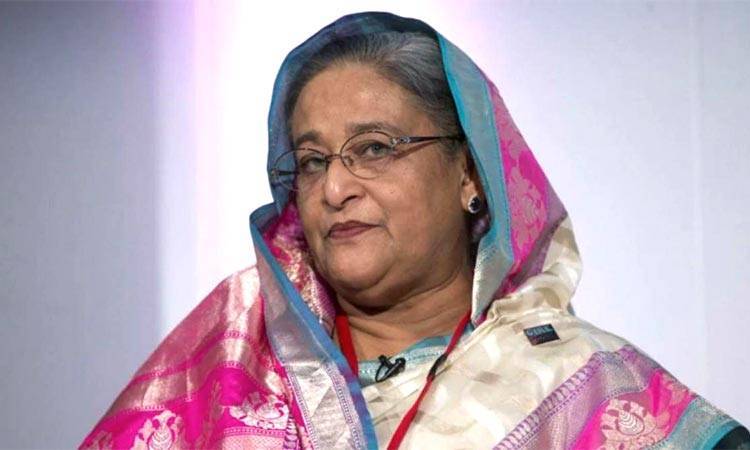Dhaka (Web Desk/Agencies): Bangladeshi Prime Minister Sheikh Hasina on Monday resigned from her office following mass protests which claimed around 300 lives.
Later, addressing the nation, Bangladesh’s army chief Waker-Uz-Zaman announced that the deaths during the anti-government protest would be investigated.
Army chief Zaman said he had held "fruitful" talks with leaders of all major political parties he had "invited" and would soon meet President Mohammed Shahabuddin to discuss the way ahead.
"The country is going through a revolutionary period," said Zaman, 58, who took over as army chief only on June 23.
"I promise you all, we will bring justice to all the murders and injustice. We request you to have faith in the army of the country. I take full responsibility and I assure you to not get disheartened," he said.
"I request you all to be a little patient, give us some time and together we will be able to solve all the problems," Zaman said. "Please don't go back to the path of violence and please return to non-violent and peaceful ways."
Television visuals showed thousands of people pouring into the streets of the capital Dhaka in jubilation and shouting slogans. Thousands also stormed Hasina's official residence 'Ganabhaban', shouting slogans, pumping fists and showing victory signs.
Crowds thronged the drawing rooms of the residence, and some people could be seen carrying away televisions, chairs and tables from what was one of the most protected buildings in the country.
"She has fled the country, fled the country," some shouted.
Protesters in Dhaka also climbed atop a large statue of independence leader Sheikh Mujibur Rahman, Hasina's father, and began chiselling away at the head with an axe, the visuals showed.
Student activists had called for a march to the capital Dhaka on Monday in defiance of a nationwide curfew to press Hasina to resign, after deadly clashes across the country on Sunday killed nearly 100 people.
On Monday, at least six people were killed in clashes between police and protesters in the Jatrabari and Dhaka Medical College areas on Monday, the Daily Star newspaper reported. Reuters could not immediately verify the report.
Sunday's death toll, which included at least 13 policemen, was the highest for a single day from any protests in Bangladesh's recent history, surpassing the 67 deaths reported on July 19 when students took to the streets against the quotas.
Last month, at least 150 people were killed and thousands injured in violence touched off by student groups protesting against quotas for government jobs.
The government declared the indefinite nationwide curfew starting at 6 p.m. (1200 GMT) on Sunday and also announced a three-day general holiday starting from Monday.
Over the weekend, there have been attacks, vandalism and arson targeting government buildings, offices of the ruling Awami League party, police stations and houses of public representatives, local media reported. Violence was reported in 39 of the country's 64 districts.
Bangladesh Railway said it had suspended all services indefinitely due to the escalating violence.
Garment factories in the country, which supply apparel to some of the top brands in the world, have also been closed indefinitely.
The role of the country's army in tackling the violence had come into focus with a group of retired military officers urging Hasina to withdraw troops from the streets and undertake "political initiatives" to resolve the crisis.
Critics of Hasina, along with human rights groups, have accused her government of using excessive force against protesters, a charge she and her ministers deny.
Hasina had said that "those who are carrying out violence are not students but terrorists who are out to destabilise the nation".
H said that an interim government would be formed in the country and that talks in this regard were under way.
Meanwhile, Indian media reported that Hasina had left Bangladesh by military helicopter, bound for India after the protestors stormed the Prime Minister's House in Dhaka.
On Saturday, Bangladeshi student leaders said they would carry on a planned nationwide civil disobedience campaign until Prime Minister Sheikh Hasina resigned following last month's deadly police crackdown on protesters.
Rallies against civil service job quotas sparked days of mayhem in July that killed more than 200 people in some of the worst unrest of Hasina's 15-year tenure.
Troop deployments briefly restored order but crowds returned to the streets in huge numbers this week ahead of an all-out non-cooperation movement aimed at paralysing the government planned to begin on Sunday.
Students Against Discrimination, the group responsible for organising the initial protests, rebuffed an offer of talks with Hasina earlier in the day before announcing their campaign would continue until the premier and her government step down.
Since late July, Bangladesh has been engulfed by protests and violence that has so far claimed the lives of at least 300 people, according to international media reports quoting the tally based on police, government officials and doctors at hospitals.


